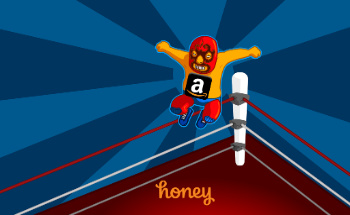When we last covered Honey last November, it was just acquired by PayPal for $4 billion. Analysts weren’t quite sure what to make of PayPal’s strategy and the price paid for the acquisition.
In an unusual move just before Christmas, Amazon began posting messages calling out the popular discount shopping and rewards app as a “security risk” according to a Wired report.

Messages appeared on Amazon warning online shoppers about the risk saying, “Honey tracks your private shopping behavior, collects data like your order history and items saved, and can read or change any of your data on any website you visit,” the message read. “To keep your data private and secure, uninstall this extension immediately.” Amazon then provided a link to instructions on how to remove the app.
Both Wired and Bloomberg say Amazon has not made similar claims about a dozen or more similar discount shopping apps and discount coupon providers.
“Amazon’s fight against Honey while letting a dozen other tools go on is confusing,” Juozas Kaziukenas, founder of New York e-commerce research firm Marketplace Pulse told Bloomberg. “I don’t buy their security risk message. They just want Honey and PayPal to be squashed.”
Not a Honey trap

For its part, Honey responded strongly that it is absolutely not a security risk and said it has opened up discussions with Amazon to resolve any concerns. Honey also said that any data used in delivering its services to users is only utilized with customer approval and sign off.
“We only use data in ways that directly benefit Honey members—helping people save money and time—and in ways they would expect. Our commitment is clearly spelled out in our privacy and security policy,” a spokesperson for Honey told WIRED.
Amazon was criticized by some industry analysts for singling out Honey when other apps provide similar services using similar client information with permission. Amazon’s claim that data was used without customer knowledge was simply not true and the company did not clarify its concern about Honey.
Honey had disabled some features briefly while it assessed how to respond to Amazon’s criticism in the past several weeks.
“We’re aware that Droplist and other Honey features were not available on Amazon for a period of time. We know these are tools that people love and worked quickly to restore the functionality. Our extension is not—and has never been—a security risk and is safe to use,” a Honey spokesperson said.
What’s up with Amazon?

Amazon has its own price tracking and discount code app called Amazon Assistant which gathers information similar to Honey, so the move by Amazon is raising questions.
If it has legitimate concerns about security with Honey, Amazon hasn’t yet responded with a clear explanation when asked by several technology media and security commentators.
Los Angeles-based Honey has grown quickly since launching in 2012 and now has more than 17 million users, who use the online app to save money at Amazon and 30,000-plus other online retailers.
It’s possible Amazon resented the Honey app benefiting both from the high volume of traffic on Amazon as well as the valuable insights potentially available from Amazon’s highly proprietary data. It’s also quite possible that Amazon continues to put barriers in the way of owner PayPal which is not allowed for payments on Amazon.
The Seattle e-commerce giant has also been criticized in the past by merchants as well as regulators for not sharing product and sales data even with its own merchants who sell on its platform
The final sticky point in this Honey dispute may be a future complaint to regulatory officials about privacy, antitrust and anti-competition concerns. That’s something Amazon and other tech giants like Google, Apple and PayPal can ill afford.








LET’S CONNECT